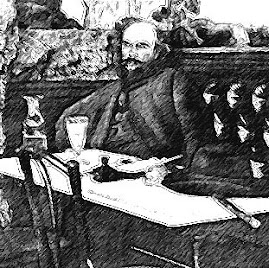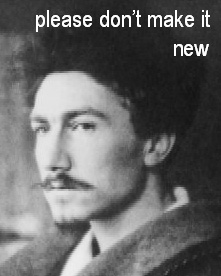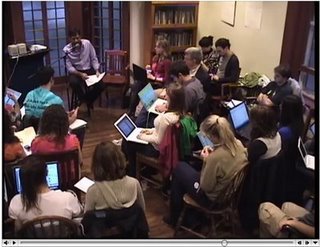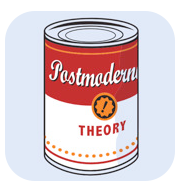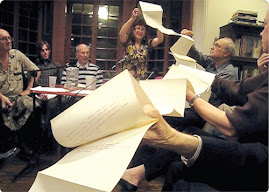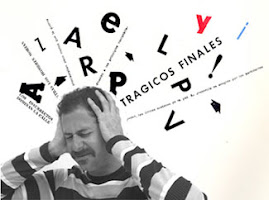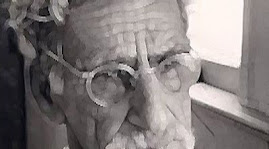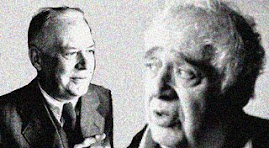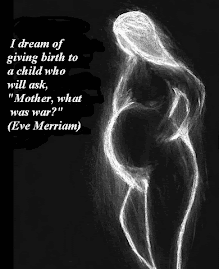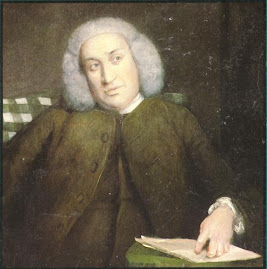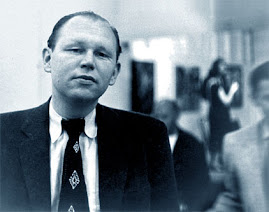 Franklin Littel has died at 91. He lived not far from where I write. I met him several times in the late 1980s at Holocaust conferences. I never warmed to him personally but I was utterly impressed by his focus on the religious aspects of the European genocide. He was among the first intellectuals to delve into the question of how baptized Christians in the heart of Christian Europe could have either killed or ignored the killing of six million Jews. Today the Times is running a fairly long obit. Possibly no one has been more influential in creating awareness of Christian complicity, shortcoming, indifference in the face of what was happening to Jews. One profile puts it this way: "Professor Franklin Littell is rightfully known as the Father of Holocaust education in America. He was the first American scholar to offer courses on the Holocaust and genocide."
Franklin Littel has died at 91. He lived not far from where I write. I met him several times in the late 1980s at Holocaust conferences. I never warmed to him personally but I was utterly impressed by his focus on the religious aspects of the European genocide. He was among the first intellectuals to delve into the question of how baptized Christians in the heart of Christian Europe could have either killed or ignored the killing of six million Jews. Today the Times is running a fairly long obit. Possibly no one has been more influential in creating awareness of Christian complicity, shortcoming, indifference in the face of what was happening to Jews. One profile puts it this way: "Professor Franklin Littell is rightfully known as the Father of Holocaust education in America. He was the first American scholar to offer courses on the Holocaust and genocide."
Saturday, May 30, 2009
first to teach Holocaust
 Franklin Littel has died at 91. He lived not far from where I write. I met him several times in the late 1980s at Holocaust conferences. I never warmed to him personally but I was utterly impressed by his focus on the religious aspects of the European genocide. He was among the first intellectuals to delve into the question of how baptized Christians in the heart of Christian Europe could have either killed or ignored the killing of six million Jews. Today the Times is running a fairly long obit. Possibly no one has been more influential in creating awareness of Christian complicity, shortcoming, indifference in the face of what was happening to Jews. One profile puts it this way: "Professor Franklin Littell is rightfully known as the Father of Holocaust education in America. He was the first American scholar to offer courses on the Holocaust and genocide."
Franklin Littel has died at 91. He lived not far from where I write. I met him several times in the late 1980s at Holocaust conferences. I never warmed to him personally but I was utterly impressed by his focus on the religious aspects of the European genocide. He was among the first intellectuals to delve into the question of how baptized Christians in the heart of Christian Europe could have either killed or ignored the killing of six million Jews. Today the Times is running a fairly long obit. Possibly no one has been more influential in creating awareness of Christian complicity, shortcoming, indifference in the face of what was happening to Jews. One profile puts it this way: "Professor Franklin Littell is rightfully known as the Father of Holocaust education in America. He was the first American scholar to offer courses on the Holocaust and genocide."
Thursday, May 28, 2009
goodbye to all that publishing
I'm reading Elizabeth Sifton's already much-discussed article about the demise of publishing in the current issue of the Nation. Here is a link to the whole, and here are two paragraphs from the middle of the piece:
 A key element in the dissemination of books, independent of publishers and booksellers but essential to both, is the press. The simultaneous collapse of the business model for newspapers and magazines is a gruesome fact of life, and we book people keenly feel the pain of a sister print-on-paper industry, to put it mildly. All citizens should be alarmed by the loss of such a vital necessity to a democracy. But the hard numbers and socioeconomic exigencies of journalism's huge crisis differ greatly from those of book publishing's smaller one (though they are often conflated). Here I want only to stress that the loss of so many book-review pages nationwide is crippling all aspects of our literary life. And I mean all. Book news and criticism were fundamental to the old model of book publishing and to the education of writers; Internet coverage of books, much of it witty and interesting, does not begin to compensate for their loss.
A key element in the dissemination of books, independent of publishers and booksellers but essential to both, is the press. The simultaneous collapse of the business model for newspapers and magazines is a gruesome fact of life, and we book people keenly feel the pain of a sister print-on-paper industry, to put it mildly. All citizens should be alarmed by the loss of such a vital necessity to a democracy. But the hard numbers and socioeconomic exigencies of journalism's huge crisis differ greatly from those of book publishing's smaller one (though they are often conflated). Here I want only to stress that the loss of so many book-review pages nationwide is crippling all aspects of our literary life. And I mean all. Book news and criticism were fundamental to the old model of book publishing and to the education of writers; Internet coverage of books, much of it witty and interesting, does not begin to compensate for their loss.
It is taking time for the obsolescence and decay in the book world to show, given the energy and talent of so many writers, their continued devotion to book genres, the resourceful bravery of some publishers, the continuing plausibility of many aspects of their business, the pleasure and profit taken in reinforcing familiar reading habits and the astonishing biodiversity of book publishing. Not to mention the usual quotient of laziness. European publishers are happy right now because things seemed to go well at the winter book fairs in Leipzig and Paris; the London Book Fair, in April, was hopeful if meager, with strenuous, incoherent efforts made to engage with the digitized word. In America, pubescent vampire novels are selling like crazy to readers of all ages, also memoirs about cats and puppies; classics are still in demand, as are cookbooks about cupcakes, of which there are an amazing number. Books by brand-name writers continue to populate the bestseller lists (though not racking up the numbers they used to). Every week the trade bulletins report hundreds of new books being signed up, sometimes for absurd amounts of money, by dozens of publishers.
Here's a bio on Sifton: "Elisabeth Sifton, senior vice president of Farrar, Straus and Giroux, was born in New York City, graduated from Radcliffe College, and began her career in publishing at Frederick A. Praeger. She became an editor at The Viking Press in 1968 and was named its editor-in-chief in 1980, then in 1983 became publisher of Elisabeth Sifton Books and vice president of Viking Penguin. Her imprint won the Carey Thomas Award for Creative Publishing in 1986. From 1987 to 1992, Ms. Sifton was executive vice president of Alfred A. Knopf. Since 1993 she has been at Farrar, Straus, where she is both an editor for its main imprint and editor at large (formerly publisher) of Hill and Wang."
 A key element in the dissemination of books, independent of publishers and booksellers but essential to both, is the press. The simultaneous collapse of the business model for newspapers and magazines is a gruesome fact of life, and we book people keenly feel the pain of a sister print-on-paper industry, to put it mildly. All citizens should be alarmed by the loss of such a vital necessity to a democracy. But the hard numbers and socioeconomic exigencies of journalism's huge crisis differ greatly from those of book publishing's smaller one (though they are often conflated). Here I want only to stress that the loss of so many book-review pages nationwide is crippling all aspects of our literary life. And I mean all. Book news and criticism were fundamental to the old model of book publishing and to the education of writers; Internet coverage of books, much of it witty and interesting, does not begin to compensate for their loss.
A key element in the dissemination of books, independent of publishers and booksellers but essential to both, is the press. The simultaneous collapse of the business model for newspapers and magazines is a gruesome fact of life, and we book people keenly feel the pain of a sister print-on-paper industry, to put it mildly. All citizens should be alarmed by the loss of such a vital necessity to a democracy. But the hard numbers and socioeconomic exigencies of journalism's huge crisis differ greatly from those of book publishing's smaller one (though they are often conflated). Here I want only to stress that the loss of so many book-review pages nationwide is crippling all aspects of our literary life. And I mean all. Book news and criticism were fundamental to the old model of book publishing and to the education of writers; Internet coverage of books, much of it witty and interesting, does not begin to compensate for their loss.It is taking time for the obsolescence and decay in the book world to show, given the energy and talent of so many writers, their continued devotion to book genres, the resourceful bravery of some publishers, the continuing plausibility of many aspects of their business, the pleasure and profit taken in reinforcing familiar reading habits and the astonishing biodiversity of book publishing. Not to mention the usual quotient of laziness. European publishers are happy right now because things seemed to go well at the winter book fairs in Leipzig and Paris; the London Book Fair, in April, was hopeful if meager, with strenuous, incoherent efforts made to engage with the digitized word. In America, pubescent vampire novels are selling like crazy to readers of all ages, also memoirs about cats and puppies; classics are still in demand, as are cookbooks about cupcakes, of which there are an amazing number. Books by brand-name writers continue to populate the bestseller lists (though not racking up the numbers they used to). Every week the trade bulletins report hundreds of new books being signed up, sometimes for absurd amounts of money, by dozens of publishers.
Here's a bio on Sifton: "Elisabeth Sifton, senior vice president of Farrar, Straus and Giroux, was born in New York City, graduated from Radcliffe College, and began her career in publishing at Frederick A. Praeger. She became an editor at The Viking Press in 1968 and was named its editor-in-chief in 1980, then in 1983 became publisher of Elisabeth Sifton Books and vice president of Viking Penguin. Her imprint won the Carey Thomas Award for Creative Publishing in 1986. From 1987 to 1992, Ms. Sifton was executive vice president of Alfred A. Knopf. Since 1993 she has been at Farrar, Straus, where she is both an editor for its main imprint and editor at large (formerly publisher) of Hill and Wang."
Labels:
books,
publishing
Wednesday, May 27, 2009
self-help Stevens
A Long Island-based psychotherapist who blogs quotes Wallace Stevens completely out of context--as self-help gloop. Renders the partly regular iambic blank-verse couplet into hyperlineated bloggy mush and even chooses a so-you-can't-miss-it mustard font color for the key phrase...
 ...but (at least by implication) seems to get it right. What does mind-body psychotherapy and meditation have to do with the poem "Man Carrying Thing"? What does that poem, a gradually intensifying wintry all-nighter pulled by the poet, have to do with any of the good doctor Crew's other entries: always shop from a list, he urges us; how to stretch your hamstring; have a clear conscience and feel good? Well, not much, but that this man would be attracted to these particular Stevensean lines did--surprsingly--get me thinking freshly about the poem, so I suppose trawling the blogosphere for 21st-century Stevens has its occasional rewards.
...but (at least by implication) seems to get it right. What does mind-body psychotherapy and meditation have to do with the poem "Man Carrying Thing"? What does that poem, a gradually intensifying wintry all-nighter pulled by the poet, have to do with any of the good doctor Crew's other entries: always shop from a list, he urges us; how to stretch your hamstring; have a clear conscience and feel good? Well, not much, but that this man would be attracted to these particular Stevensean lines did--surprsingly--get me thinking freshly about the poem, so I suppose trawling the blogosphere for 21st-century Stevens has its occasional rewards.
In the morning, we suddenly see what we had not been able to see before: "A horror of thoughts that suddenly are real."
See freely beyond (or, really: after) the sight-obscuring blizzard of uncertainties, as the uncertainties themselves have kept hidden from us the terror of truth; thus see that that enactment is inescapable. This is his turn from the torment of difficulty toward lucidity. Description is revelation, yes, but better still is the poem that describes the process through which the writer can get (in the clear light of day) to the point of being able to describe with some confidence.
 ...but (at least by implication) seems to get it right. What does mind-body psychotherapy and meditation have to do with the poem "Man Carrying Thing"? What does that poem, a gradually intensifying wintry all-nighter pulled by the poet, have to do with any of the good doctor Crew's other entries: always shop from a list, he urges us; how to stretch your hamstring; have a clear conscience and feel good? Well, not much, but that this man would be attracted to these particular Stevensean lines did--surprsingly--get me thinking freshly about the poem, so I suppose trawling the blogosphere for 21st-century Stevens has its occasional rewards.
...but (at least by implication) seems to get it right. What does mind-body psychotherapy and meditation have to do with the poem "Man Carrying Thing"? What does that poem, a gradually intensifying wintry all-nighter pulled by the poet, have to do with any of the good doctor Crew's other entries: always shop from a list, he urges us; how to stretch your hamstring; have a clear conscience and feel good? Well, not much, but that this man would be attracted to these particular Stevensean lines did--surprsingly--get me thinking freshly about the poem, so I suppose trawling the blogosphere for 21st-century Stevens has its occasional rewards.In the morning, we suddenly see what we had not been able to see before: "A horror of thoughts that suddenly are real."
We must endure our thoughts all night, until
The bright obvious stands motionless in cold.
See freely beyond (or, really: after) the sight-obscuring blizzard of uncertainties, as the uncertainties themselves have kept hidden from us the terror of truth; thus see that that enactment is inescapable. This is his turn from the torment of difficulty toward lucidity. Description is revelation, yes, but better still is the poem that describes the process through which the writer can get (in the clear light of day) to the point of being able to describe with some confidence.
Labels:
Wallace Stevens
Monday, May 25, 2009
call back the dead & sleeping senses
Night of the living linguistic dead. That's the essence of Sherwood Anderson's gone-awry comments on the writing of Gertrude Stein: "Every artist working with words as his medium must at times be profoundly irritated by what seems the limitations of his medium. What things does he not wish to create with words! There is the mind of the reader before him and he would like to create in that reader's mind a whole new world of sensations, or rather one might better say he would like to call back into life all of the dead and sleeping senses."
Labels:
Gertrude Stein
Sunday, May 24, 2009
American poetry after 1975

American Poetry after 1975, edited by Charles Bernstein, a special issue of boundary 2 (Vol. 36, no. 3). 225 pages (November 2009). You can order now.
"This issue offers a wide-ranging survey of poetic practice in the United States since the mid-1970s. Comprising scholarship, essays, and poems, “American Poetry after 1975” brings together notable senior critics such as Al Filreis, Marjorie Perloff, and Herman Rapaport, as well as younger critics who are redefining the field. The issue looks at new directions in American poetry as well as contemporary trends such as conceptual poetry; multilingual poetry; ecopoetics, in which writing reaches environmental concerns; and Flarf, subversive poetry that uses search-engine results, grammatical inaccuracies, and intentionally bad taste.
"Writing from the forefront of American poetry criticism, contributors to this special issue address topics such as the poetics of disability and the work of clairvoyant poet Hannah Weiner, ambience and the work of Tan Lin, the continuing influence of Wallace Stevens, and the use of found text in Susan Howe’s “The Midnight.” Two younger critics address their generation’s poetics, one by considering the social relevance of the lyric and the other by examining resistance to innovative poetry practice. The intersection of poetry and technology is explored in articles about digital spaces and radical poetry’s relationship with the digital archive. One contributor applies the work of philosopher J. L. Austin to the language of hip-hop and the work of rapper Rakim. Also included are four short poems, a panegyric for the poetics of sophism in critical discourse, and essays that address the aesthetics of sentimental poetry and the poetics of place."
Contributors. Christian Bök, Craig Dworkin, Al Filreis, Benjamin Friedlander, Peter Gizzi, Kenneth Goldsmith, Nada Gordon, Tan Lin, Joyelle McSweeney, Tracie Morris, Marjorie Perloff, Scott Pound, Herman Rapaport, Brian Reed, Jim Rosenberg, Jennifer Scappettone, Lytle Shaw, Jonathan Skinner, Juliana Spahr, Elizabeth Willis.
deep connections
Third Factory runs its "Attention Span" series (comments on poetry) every so often. Yesterday a new "Attention Span" was released--by Tom Devaney. One of Devaney's selections, I'm pleased to say, was my book:
While you're at Third Factory, be sure to keep up with Lipstick of Noise - listening and linking to poetry audio files.
Alan Filreis | Counter-Revolution of the Word: The Conservative Attack on Modern Poetry, 1945-1960 | North Carolina | 2008
Yes, it’s a serious historical book, a major book, but Filreis’s personal voice and deep connections to mid-century modernism show how many formal concerns of the work were linked to progressive politics; it is an untold history of the so-called language/nature problem (and the reactions to it) that continue into our moment.
While you're at Third Factory, be sure to keep up with Lipstick of Noise - listening and linking to poetry audio files.
Labels:
antimodernism
Friday, May 22, 2009
Stevens reaches the dead end
 Here at a large conference hotel on Copley Square in Boston for a session convened by George Lensing. George asked five of us to come with our favorite three poems by Wallace Stevens. Or, to be a little more specific: the three poems that have shaped or are shaping us. My three: "Mozart, 1935," the XXth canto of The Man with the Blue Guitar, and "The Plain Sense of Things." These are Stevens reaching a dead end, in need of a restart, trying to turn a corner. Learning what it is poetically to reach the end of a line and grope around, in the poem itself, for the new line. In "Mozart" a man is told by the speaker (all imperatives) to play Mozart while rioters are throwing stones at the house and while several have entered the house and are bringing a body down the stairs. How can one going on playing such pure music at a time like this? The second--the "BG" canto--is as close to pure music as Stevens gets. It's linguistically his most experimental poem. He repeats most of the words of the poem, so that few are used, far fewer than the total number of words. It's an over-and-over-again lyric. The back-and-forth argument of the first 19 cantos has here reached its endpoint: nowhere to go ideationally or ideologically. Retreat into pure sound becomes a great liberation. Strumming is improvisation. Constraint can be improvisation. This is the way out. "Plain Sense," a late poem, can't think of the next adjective. This is poetic senility, exhaustion. The whole project is a botch (like Pound assessing the Cantos near the end), and yet, and yet, the poet realizes that this too--this blankness, this end-state--can constitute a poetics, and then end of the imagination is itself one of those things that the imagination has the power to imagine. Another dead-end averted in the poem.
Here at a large conference hotel on Copley Square in Boston for a session convened by George Lensing. George asked five of us to come with our favorite three poems by Wallace Stevens. Or, to be a little more specific: the three poems that have shaped or are shaping us. My three: "Mozart, 1935," the XXth canto of The Man with the Blue Guitar, and "The Plain Sense of Things." These are Stevens reaching a dead end, in need of a restart, trying to turn a corner. Learning what it is poetically to reach the end of a line and grope around, in the poem itself, for the new line. In "Mozart" a man is told by the speaker (all imperatives) to play Mozart while rioters are throwing stones at the house and while several have entered the house and are bringing a body down the stairs. How can one going on playing such pure music at a time like this? The second--the "BG" canto--is as close to pure music as Stevens gets. It's linguistically his most experimental poem. He repeats most of the words of the poem, so that few are used, far fewer than the total number of words. It's an over-and-over-again lyric. The back-and-forth argument of the first 19 cantos has here reached its endpoint: nowhere to go ideationally or ideologically. Retreat into pure sound becomes a great liberation. Strumming is improvisation. Constraint can be improvisation. This is the way out. "Plain Sense," a late poem, can't think of the next adjective. This is poetic senility, exhaustion. The whole project is a botch (like Pound assessing the Cantos near the end), and yet, and yet, the poet realizes that this too--this blankness, this end-state--can constitute a poetics, and then end of the imagination is itself one of those things that the imagination has the power to imagine. Another dead-end averted in the poem.There, that's my talk. Now can I go back to Philly?
Labels:
Wallace Stevens
Wednesday, May 20, 2009
valedictions
 John Carroll's photos of the annual Writers House event celebrating the achievements of some KWH-affiliated students whom we adore: here.
John Carroll's photos of the annual Writers House event celebrating the achievements of some KWH-affiliated students whom we adore: here.
Labels:
Kelly Writers House
Tuesday, May 19, 2009
returning home
 I am delighted to announce that we at the Kelly Writers House have a new Assistant Director for Development. On July 1, Arielle Brousse is making her return to the Writers House after several years of superb work on the staff of the development department at The Franklin Institute here in Philadelphia. Having been a work-study student at the Writers House for four years as an undergraduate, and an active member of the “hub” (our Planning Committee) Arielle is “thrilled to bring my experience back home.” At The Franklin Institute, Arielle worked on everything from non-preferred State appropriations and competitive federal government grants to designing punchy flyers, writing custom-tailored proposals, and helping to plan cultivation events. The switch from working at a science museum to working once again for a literary arts center might require a bit of re-adjustment, but she is confident she'll be able to handle it: if anyone in the hub ever needs a Spock costume or a Galilean thermometer, she's got you covered.
I am delighted to announce that we at the Kelly Writers House have a new Assistant Director for Development. On July 1, Arielle Brousse is making her return to the Writers House after several years of superb work on the staff of the development department at The Franklin Institute here in Philadelphia. Having been a work-study student at the Writers House for four years as an undergraduate, and an active member of the “hub” (our Planning Committee) Arielle is “thrilled to bring my experience back home.” At The Franklin Institute, Arielle worked on everything from non-preferred State appropriations and competitive federal government grants to designing punchy flyers, writing custom-tailored proposals, and helping to plan cultivation events. The switch from working at a science museum to working once again for a literary arts center might require a bit of re-adjustment, but she is confident she'll be able to handle it: if anyone in the hub ever needs a Spock costume or a Galilean thermometer, she's got you covered.
Labels:
Kelly Writers House
digress 10% and you too can become a verb
 Google CEO Eric Schmidt gave a nice but predictable talk at Penn's commencement yesterday. I was on hand, having a soft spot for pomp and circumstance (more the latter than the former, but still...) At something like half the commencements I've attended, the College of Arts & Science students send up lusty boos upon hearing the business school students (Wharton) announced and touted. I thought I had a good barometer for this, and yesterday--given the apparently fallen status of the figure of the businessperson in America--I expected the boos. But they didn't come. Not a one. Is it that the Classics and Art History majors know that they are just as lost in the world of prospective employment as the 22-year-old now-former student of finance or management? Or that today's college student is too smart and nuanced and individualistic to draw generalizations about what people choose to study from the media's recent second thoughts about business?
Google CEO Eric Schmidt gave a nice but predictable talk at Penn's commencement yesterday. I was on hand, having a soft spot for pomp and circumstance (more the latter than the former, but still...) At something like half the commencements I've attended, the College of Arts & Science students send up lusty boos upon hearing the business school students (Wharton) announced and touted. I thought I had a good barometer for this, and yesterday--given the apparently fallen status of the figure of the businessperson in America--I expected the boos. But they didn't come. Not a one. Is it that the Classics and Art History majors know that they are just as lost in the world of prospective employment as the 22-year-old now-former student of finance or management? Or that today's college student is too smart and nuanced and individualistic to draw generalizations about what people choose to study from the media's recent second thoughts about business?Was Schmidt's talk going to be about better management? I doubted it. I thought it would be about innovation and the ethics of the workplace.
But Schmidt's messages were Google's oft-repeated twin messages: (1) don't be evil; and (2) "70-20-10." Spend 70% of your time on the basic expected activities of what you do; 20% on innovation (new projects); and 10% doing whatever digressive, miscellaneous thing you feel like doing ("side projects"). Most of the good new stuff comes from that final 10%. But all that depends on leisure, on other deadlines being met, and--for most businesses--a currently profitable or at least growing core (70%) business. So some of this fell into the "easy for you to say" bin of graduation-speaker platitudes. Perhaps what struck me as more remarkable than any of this (above) was his absolute assumption that technological change is always for the good. Where once we did this, now, lookee here!, we can do this (faster, better, sooner). It's all good. Just a few years ago such statements would always rhetorically require some acknowledgment of the doubts, the counterargument that technological innovation without ethics and good content was empty progress and indeed alienating. None of that yesterday on Franklin Field. To be sure, the Google CEO would ever truly have conceded the legitimacy of such doubts; no, but my point is he didn't feel the need even to acknowledge their existence. And I suppose most of the 10,000 of us there didn't feel that lack pass us by: we were (I too) playing with our phones, texting friends not there, checking the weather to see if it would rain before the end of the ceremony, sending pics to friends and family who didn't have the close-up view of the stage, live-Twittering condensations of the speaker's points, watching the new email pile up.
This is what I'm doing for my 10% today: I'm casting about for things I've achieved or made that might someday become a verb.
Sunday, May 17, 2009
don't work
 "I really would like to stop working forever--never work again," said Allen Ginsberg to his shrink. [ MORE... ]
"I really would like to stop working forever--never work again," said Allen Ginsberg to his shrink. [ MORE... ]
Labels:
Allen Ginsberg,
triumph of the therapeutic
Saturday, May 16, 2009
American routes
 Nick Spitzer, an musical ethnographer who loves to talk about the nexus of cultures that is New Orleans, came to the Writers House this afternoon to tell some "stories and songs from the road." He's of course the producer and host of public radio's "American Routes." Of course we made a video of the event - also downloadable audio. I happily introduced Nick, grateful that a few years ago he found me at the Writers House and instantly understood the experiment in creative learning community we were trying.
Nick Spitzer, an musical ethnographer who loves to talk about the nexus of cultures that is New Orleans, came to the Writers House this afternoon to tell some "stories and songs from the road." He's of course the producer and host of public radio's "American Routes." Of course we made a video of the event - also downloadable audio. I happily introduced Nick, grateful that a few years ago he found me at the Writers House and instantly understood the experiment in creative learning community we were trying.
Labels:
Kelly Writers House,
public radio
Thursday, May 14, 2009
ArtsEdge
 This was the first year of our ArtsEdge artist-in-residence program, which we're doing in collaboration with the department of fine arts in Penn's School of Design. We offer housing, workspace, and a significant rent subsidy--and, if apt, a course to teach. Greg Romero was our first ArtsEdge-er, a playwright. Not long ago he staged a play-in-progress at the Writers House and today the Philly Fringe Festival blog ran an entry about it.
This was the first year of our ArtsEdge artist-in-residence program, which we're doing in collaboration with the department of fine arts in Penn's School of Design. We offer housing, workspace, and a significant rent subsidy--and, if apt, a course to teach. Greg Romero was our first ArtsEdge-er, a playwright. Not long ago he staged a play-in-progress at the Writers House and today the Philly Fringe Festival blog ran an entry about it.
Labels:
arts,
Kelly Writers House,
West Philadephia
Wednesday, May 13, 2009
high school, haiku, tweet tweet
I just twittered the following:
The tweet in itself was precisely 140 characters. Here in blogger, though, it seems so bare, so minimal. In the twitter format I use (the application called "Tweetie") the full 140-character update fills the space and makes me feel downright loquacious. These new media really are our messages. You'd think I'd have discovered this before now.
By the way, the poet mentioned in the tweet above was Tom Devaney. At the Writers House, I hosted eleven eleventh graders who are currently in a one-trimester poetry class. We had a 2.5-hour session. I decided to bring in six Philadelphia poets--of all sorts--to present to them each in 20 minutes a single short poem. The chosen poem was to be a way for the students to learn about the poet making the presentation.
Tom cheated a bit--bringing in not one poem but three. First, two translations of the Basho favorite (the old pond, frog jumps in, kerplunk) and then John Ashbery's haiku from A Wave.
It worked. After discussing the Basho, they were ready to take on Ashbery and spoke remarkably well and freely about the Ashberyian line as if it were as explicatable as a haiku. Generic familiarity. I don't know how accidentally Tom fell into this pedagogical move, but it worked. Below is a portion of Ashbery's "Haiku." The line that encouraged the best discussion, a favorite of the students:
"And it is a dream sailing in a dark, unprotected cove."
It is the most haiku-like (static and imagistic yet open and resisting sense) and yet just the sort of line that causes Ashbery's readers (outside the haiku context) to scratch their heads. Nice going, Tom!

- - -
A few weeks later: we've now created a PennSound page with links to audio and video of each 20-minute session.
A poet in a serious discussion yesterday used the example of 140 characters as a constraint-based poetics. He was talking about haiku, natch
The tweet in itself was precisely 140 characters. Here in blogger, though, it seems so bare, so minimal. In the twitter format I use (the application called "Tweetie") the full 140-character update fills the space and makes me feel downright loquacious. These new media really are our messages. You'd think I'd have discovered this before now.
By the way, the poet mentioned in the tweet above was Tom Devaney. At the Writers House, I hosted eleven eleventh graders who are currently in a one-trimester poetry class. We had a 2.5-hour session. I decided to bring in six Philadelphia poets--of all sorts--to present to them each in 20 minutes a single short poem. The chosen poem was to be a way for the students to learn about the poet making the presentation.
Tom cheated a bit--bringing in not one poem but three. First, two translations of the Basho favorite (the old pond, frog jumps in, kerplunk) and then John Ashbery's haiku from A Wave.
It worked. After discussing the Basho, they were ready to take on Ashbery and spoke remarkably well and freely about the Ashberyian line as if it were as explicatable as a haiku. Generic familiarity. I don't know how accidentally Tom fell into this pedagogical move, but it worked. Below is a portion of Ashbery's "Haiku." The line that encouraged the best discussion, a favorite of the students:
"And it is a dream sailing in a dark, unprotected cove."
It is the most haiku-like (static and imagistic yet open and resisting sense) and yet just the sort of line that causes Ashbery's readers (outside the haiku context) to scratch their heads. Nice going, Tom!

- - -
A few weeks later: we've now created a PennSound page with links to audio and video of each 20-minute session.
Labels:
Kelly Writers House,
pedagogy,
social media,
twitter
Tuesday, May 12, 2009
Saturday, May 09, 2009
my audio letter to the world

Julie Harris (b. 1925) recited poems by Emily Dickinson in three sessions, the first in 1960 and the second and third in 1961. I own the LP. We at PennSound will try to get permission from Ms. Harris and/or HarperAudio (who have assumed control of the old Caedmon recordings) and perhaps someday will be able to offer these remarkable readings for free as downloadable mp3 files.
decisively extreme
 Only very rarely--and even then, cautiously--do I think of heroism in the old-fashioned sense. When I do, I can count four or five figures (of any era) whom I consider heroic. One of these is Kazik. Here is Kazik, alive and mostly well, a few years ago, on the set of Uprising (standing with Stephen Moyer, the actor who played him in the movie). A few years ago I had a chance to speak with Moyer about what it felt like to stand with Kazik, to play him, to attempt to do justice to the decisive extremity of his behavior. After this talk--certainly indirect contact with the man--I was sweaty in the palms. This was the city of my people--who'd gone, easily or with difficulty and maybe even somewhat resistantly--to the Umschlagplatz and gotten on the trains, bound for Treblinka. Kazik of course was one of those who did not get on the train. What is my relation to him? It's hard to decipher.
Only very rarely--and even then, cautiously--do I think of heroism in the old-fashioned sense. When I do, I can count four or five figures (of any era) whom I consider heroic. One of these is Kazik. Here is Kazik, alive and mostly well, a few years ago, on the set of Uprising (standing with Stephen Moyer, the actor who played him in the movie). A few years ago I had a chance to speak with Moyer about what it felt like to stand with Kazik, to play him, to attempt to do justice to the decisive extremity of his behavior. After this talk--certainly indirect contact with the man--I was sweaty in the palms. This was the city of my people--who'd gone, easily or with difficulty and maybe even somewhat resistantly--to the Umschlagplatz and gotten on the trains, bound for Treblinka. Kazik of course was one of those who did not get on the train. What is my relation to him? It's hard to decipher. I promise that others on my list of heroes do not create such complex figurations.
My son, by the way, owns a signed copy of this photo.
Friday, May 08, 2009
his books were like vaccines
 By the time Michael Cunningham showed up to talk with my students they were already in love with him - with the prose of The Hours (but, to be sure, we'd read each of C's novels). But there he was in person: kind as could be, ready to listen to these young people, and he had on a great pair of boots, with a heel and a seriously shitkicking pointed toe. The kids were knocked out. That was 2002 and the scene of Michael's entrance into the room of expectant, bright but ready-to-be-wowed 18-22 year olds is what I remember. Now I've gone back to listen to his reading (he read from The Hours) and the interview/conversation I conducted the next day, and realize what good content there was too. Dan Fishback, now a pretty successful political comic writer/performer in New York, gave the introduction--and we've preserved the text of it. It begins:
By the time Michael Cunningham showed up to talk with my students they were already in love with him - with the prose of The Hours (but, to be sure, we'd read each of C's novels). But there he was in person: kind as could be, ready to listen to these young people, and he had on a great pair of boots, with a heel and a seriously shitkicking pointed toe. The kids were knocked out. That was 2002 and the scene of Michael's entrance into the room of expectant, bright but ready-to-be-wowed 18-22 year olds is what I remember. Now I've gone back to listen to his reading (he read from The Hours) and the interview/conversation I conducted the next day, and realize what good content there was too. Dan Fishback, now a pretty successful political comic writer/performer in New York, gave the introduction--and we've preserved the text of it. It begins:I signed up for this class in a kind of prideless, bumbling squirt -- I emailed Al, "Cunningham is my personal Jesus, you have to let me in, you have to, you have to." But then I calmed down, because I realized I'd be taking these books into the realm of other people -- and new perspectives seemed dangerous somehow. Just before I came to college, I read A Home at the End of the World, Flesh and Blood, and The Hours; and they were like...vaccines.
Labels:
Writers House Fellows
Thursday, May 07, 2009
taking the plums
 New audio: William Carlos Williams offers commentary on
New audio: William Carlos Williams offers commentary on "This Is Just to Say" (the "rape of the icebox" poem) and includes his reading of his wife's reply to the poem. This is an audio-only clip from the documentary film about WCW's life and work made as part of the "Voices & Visions" series, so you will hear the music put behind an animated recreation of the writing of the note-poem, Flossie's discovery of it and her response to it.
inescapable rhythms
 The chamber group pictured here a decade ago decided to name itself "The Eighth Blackbird," having rejected several other poetic references such as "Red Wheelbarrow." There are thirteen blackbirds, of course. So why the eighth? Is it the music's unavoidable, inexorable meter? Is it the focused circular knowing of the musician in the midst of his or her playing? Well, anyway:
The chamber group pictured here a decade ago decided to name itself "The Eighth Blackbird," having rejected several other poetic references such as "Red Wheelbarrow." There are thirteen blackbirds, of course. So why the eighth? Is it the music's unavoidable, inexorable meter? Is it the focused circular knowing of the musician in the midst of his or her playing? Well, anyway:VIII
I know noble accents
And lucid, inescapable rhythms;
But I know, too,
That the blackbird is involved
In what I know.
It's good to know that in the mid-90s someone at Oberlin College was apparently teaching Wallace Stevens.
Aw, but enough lucidity. For my part, I want to listen to the music of a group named "First Blackbird," making sounds based on this:
II
I was of three minds,
Like a tree
In which there are three blackbirds.
And on some days, "Tenth Blackbird" would do very aptly:
X
At the sight of blackbirds
Flying in a green light,
Even the bawds of euphony
Would cry out sharply.
Labels:
music,
Wallace Stevens
Wednesday, May 06, 2009
Russell Banks
 Russell Banks visited for two days in 2004. He was introduced by Jamie-Lee Josselyn, fellow northern New Englander. We've made Banks' reading (from the opening of the novel The Darling, then not yet published) and the interview I conducted the next morning available as downloadable audio recordings. They are linked here along with photos and an essay about the Banks visit written by Megan Scanlon.
Russell Banks visited for two days in 2004. He was introduced by Jamie-Lee Josselyn, fellow northern New Englander. We've made Banks' reading (from the opening of the novel The Darling, then not yet published) and the interview I conducted the next morning available as downloadable audio recordings. They are linked here along with photos and an essay about the Banks visit written by Megan Scanlon.
Labels:
novel,
Writers House Fellows
Tuesday, May 05, 2009
the sun is still not the sun
 In the past four months Matthew Abess, Cecilia Corrigan, Ned Eisenberg, Kim Eisler, Trisha Low, and Kaegan Sparks explored the topography of testimony to life in extremis (in particular, the Holocaust). This follows, for Matthew anyway, from my course on the problems of representing the Holocaust, where the issue is most discernible in our discussions of Claude Lanzmann's Shoah, the poems of Paul Celan, the study of survivors made by Terrence Des Pres, and the videotaped survivor testimonies housed at Yale University. That's the intellectual geneology or paths that converged, roughly speaking, and this group, led by Matt, journeyed along it quite a bit further. Recently they made a presentation at the Writers House; now we have both audio and video recordings of the event available.
In the past four months Matthew Abess, Cecilia Corrigan, Ned Eisenberg, Kim Eisler, Trisha Low, and Kaegan Sparks explored the topography of testimony to life in extremis (in particular, the Holocaust). This follows, for Matthew anyway, from my course on the problems of representing the Holocaust, where the issue is most discernible in our discussions of Claude Lanzmann's Shoah, the poems of Paul Celan, the study of survivors made by Terrence Des Pres, and the videotaped survivor testimonies housed at Yale University. That's the intellectual geneology or paths that converged, roughly speaking, and this group, led by Matt, journeyed along it quite a bit further. Recently they made a presentation at the Writers House; now we have both audio and video recordings of the event available.
Labels:
holocaust,
Kelly Writers House,
pedagogy
any one doing something and standing
 New audio. A brief informal introduction to cubist language by way of Gertrude Stein and Ernest Hemingway (the 1920s Hem, to be sure).
New audio. A brief informal introduction to cubist language by way of Gertrude Stein and Ernest Hemingway (the 1920s Hem, to be sure).Stein: "Any one doing something and standing is one doing something and standing. Some one was doing something and was standing. / Any one doing something and standing is one doing something and standing. Any one doing something and standing is one who is standing and doing something. Some one was doing something and was standing. That one was doing something standing."
Hemingway, from "On the Quai at Smyrna": "The strange thing was, he said, how they screamed every night at midnight. I do not know why they screamed at that time. We were in the harbor and they were all on the pier and at midnight they started screaming. We used to turn the searchlight on them to quiet them. That always did the trick. We'd run the searchlight up and down over them two or three times and they stopped it."
Here is the audio (mp3).
- - -
Joseph Hutchinson has blogged in response to this entry.
Labels:
cubism,
English 88,
Gertrude Stein,
Hemingway
Monday, May 04, 2009
Pete's 90th
 Dave Matthews at the Garden last night.
Dave Matthews at the Garden last night.I and 15,000 others sang "Happy Birthday" to Pete Seeger last night at Madison Square Garden. Springsteeen sang "The Ghost of Tom Joad" with Tom Morello, after a longish introduction by Bruce which ended: "He's gonna look a lot like your granddad that wears flannel shirts and funny hats. He gonna look like your granddad if your granddad can kick your ass." We saw and heard Dave Matthews, John Mellencamp ("If I Had a Hammer"), Ani DiFranco (selflessly sang to accompany several others), Arlo Guthrie ("Oh Mary Don't You Weep" with the Preservation Hall Jazz Band), Billy Bragg (prefaced by a great story of Pete's musical teachings), Bruce Cockburn (intense as always), Emmylou Harris (the most moving performance of "The Water Is Wide" I"ve ever heard), Joan Baez (two songs--the first not quite her usual, the second, "Jacob's Ladder," fantastic), Kris Kristofferson ("Got a Hole in My Bucket, Dear Liza"), Ramblin' Jack Elliott, Richie Havens (sang "Freedom"--his Woodstock song), Roger McGuinn (did the Animals version of "Turn, Turn, Turn"), Steve Earle, Taj Mahal (a favorite of mine), Bernice Reagon, Dar Williams, Tom Chapin, Tom Paxton, Eric Weissberg, and others.
The opening of the 4-hour performance: a lone light shone on Seeger (but we didn't really know it was Pete) as he played a flute solo called "Menomonee Love Song." As the lights came up, they revealed the outline of a sloop, apt for an event titled the "Clearwater Concert" after the organization's vessel, the gaff sloop Clearwater.
Best:
1) Dave Matthews, after telling us he should introduce himself as "David," since that's what his mother called him and she was the one who took him to his first concert, near Croton NY--a Pete Seeger concert. Matthews sang an emotional but musically pure version of "Whiskey Rye Whiskey."
 2) Emmylou Harris, "The Water Is Wide," as noted above. Not a dry eye in the house.
2) Emmylou Harris, "The Water Is Wide," as noted above. Not a dry eye in the house.3) Springsteen and Morello, trading verses of "The Ghost of Tom Joad." Earlier in the week (!) I'd seen Bruce with the E Street Band, a great concert. The whole band did its hauntingly good "Tom Joad," but this, Bruce in the clear voice of a guy singing for just 10 minutes in a whole evening, and two acoustic guitars, and a harmony with Morello, was even better.
4) Seeger, Baez, Billy Bragg, Emmy Lou Harris singing "We Shall Overcome."
Labels:
Bruce Springsteen,
folk songs,
Pete Seeger
Sunday, May 03, 2009
immense dew
 Regular readers of this blog will know that I tend to follow the contemporary uses of Wallace Stevens. Most of this is of course trivial and/or incidental. Yet some of it makes startling great sense. Laura, a watercolorist who seems to reside in or aesthetically dwell upon some tropical clime, re-read "Nomad Exquisite" (presumably while painting one of her florid watercolors) and it suggested to her that it was time for another whiskey smash. She gives the recipe for the whiskey smash just below the poem, in similar format. So I read the poem and the drink recipe and realized that as parallel texts they make a great deal of sense. Especially after a few smashes. (Laura calls this drink her "summer Manhattan.")
Regular readers of this blog will know that I tend to follow the contemporary uses of Wallace Stevens. Most of this is of course trivial and/or incidental. Yet some of it makes startling great sense. Laura, a watercolorist who seems to reside in or aesthetically dwell upon some tropical clime, re-read "Nomad Exquisite" (presumably while painting one of her florid watercolors) and it suggested to her that it was time for another whiskey smash. She gives the recipe for the whiskey smash just below the poem, in similar format. So I read the poem and the drink recipe and realized that as parallel texts they make a great deal of sense. Especially after a few smashes. (Laura calls this drink her "summer Manhattan.")Nomad Exquisite
As the immense dew of Florida
Brings forth
The big-finned palm
And green vine angering for life,
As the immense dew of Florida
Brings forth hymn and hymn
From the beholder,
Beholding all these green sides
And gold sides of green sides,
And blessed mornings,
Meet for the eye of the young alligator,
And lightning colors
So, in me, comes flinging
Forms, flames, and the flakes of flames.
Labels:
Florida,
painting,
ut pictura poesis,
Wallace Stevens
Holocaust verse
 The blog, "Writing the Holocaust," as of this morning has just two blog posts, one for March and one for April. But it's of interest to me nevertheless. April's is a longish entry giving "some cautions on writing Holocaust poetry." It begins with Charles Reznikoff and makes reference to Holocaust verse by Snodgrass, Rich, C.K. Williams, et alia.
The blog, "Writing the Holocaust," as of this morning has just two blog posts, one for March and one for April. But it's of interest to me nevertheless. April's is a longish entry giving "some cautions on writing Holocaust poetry." It begins with Charles Reznikoff and makes reference to Holocaust verse by Snodgrass, Rich, C.K. Williams, et alia.
Saturday, May 02, 2009
who shall say I am not the happy genius?
William Carlos Williams, "Danse Russe"
If I when my wife is sleeping
and the baby and Kathleen
are sleeping
and the sun is a flame-white disc
in silken mists
above shining trees,--
if I in my north room
dance naked, grotesquely
before my mirror
waving my shirt round my head
and singing softly to myself:
"I am lonely, lonely.
I was born to be lonely,
I am best so!"
If I admire my arms, my face,
my shoulders, flanks, buttocks
again the yellow drawn shades,--
Who shall say I am not
the happy genius of my household?
[c. 1917]
- - -
 Shawn Walker and I discuss the poem - an audio mini-lesson recorded for an all-online version of my English 88 course around 10 years ago. Williams recorded the poem a number of times, but here is a version made in 1950.
Shawn Walker and I discuss the poem - an audio mini-lesson recorded for an all-online version of my English 88 course around 10 years ago. Williams recorded the poem a number of times, but here is a version made in 1950.
If I when my wife is sleeping
and the baby and Kathleen
are sleeping
and the sun is a flame-white disc
in silken mists
above shining trees,--
if I in my north room
dance naked, grotesquely
before my mirror
waving my shirt round my head
and singing softly to myself:
"I am lonely, lonely.
I was born to be lonely,
I am best so!"
If I admire my arms, my face,
my shoulders, flanks, buttocks
again the yellow drawn shades,--
Who shall say I am not
the happy genius of my household?
[c. 1917]
- - -
 Shawn Walker and I discuss the poem - an audio mini-lesson recorded for an all-online version of my English 88 course around 10 years ago. Williams recorded the poem a number of times, but here is a version made in 1950.
Shawn Walker and I discuss the poem - an audio mini-lesson recorded for an all-online version of my English 88 course around 10 years ago. Williams recorded the poem a number of times, but here is a version made in 1950.
Labels:
English 88,
WCW
Friday, May 01, 2009
begging the reader's indulgence--not
 On Tuesday morning I interviewed novelist Mary Gordon during her second day here as our final Writers House Fellow for '09. The recording of what was a live video feed is ready. There is also a downloadable audio recording as well.
On Tuesday morning I interviewed novelist Mary Gordon during her second day here as our final Writers House Fellow for '09. The recording of what was a live video feed is ready. There is also a downloadable audio recording as well.I told her that the stories I admired most were her meta-stories - stories in which narrrative problems are foregrounded, in which the narrator's problem is part of the story, in which a Gordonian figure appears to talk about how the story got constructed or nearly prevented. The most upbeat of these is called "Storytelling." The most compelling is one called "Intertexuality," where the narrator's (indeed, and Mary's) embarrassing and sometimes hateful stolid grandmother angrily responds to her house having been completely made over while she was sent away for a vacation in Florida, and then gets treated to a finale in which she enters a scene in Proust, whom the narrator/Mary has been reading. The second intertext is this story itself.
After chatting about such meta-stories, and about "Intertexuality," I asked M.G. to read the end of that story. This is near the beginning of the recording. At the end, I ask her to read from the memoir she wrote in the mid-90s about the awful father whom she nonetheless adored (and somewhat still adores). In the passage she reads, from a preface directed "To the Reader," she is just about to ask the reader's indulgence--that conventional gesture--but then realizes that she's not writing for readers, but for her father, and so, she says, the writing is an undying. Powerful, compelling and not just a little creepy.
Labels:
Kelly Writers House,
Mary Gordon,
novel,
Writers House Fellows
Subscribe to:
Posts (Atom)








 "I teach horizontally, meaning that while I might begin with a fixed idea of what I'm going to teach that day, I let it drift rhizomatically way off topic, often pulling it back when it gets too far. I rely on non-fixed materials to teach this way; the whole world is at my fingertips. Should I go off on a tangent about John and Rauschenberg and their love relationship as expressed in Rauschenberg's bed, an image of that bed is always a click away. From there, we can head anywhere into the non-fixed universe, be it film, text or sound. And of course, that always takes us elsewhere. As Cage says, 'We are getting nowhere fast.'"
"I teach horizontally, meaning that while I might begin with a fixed idea of what I'm going to teach that day, I let it drift rhizomatically way off topic, often pulling it back when it gets too far. I rely on non-fixed materials to teach this way; the whole world is at my fingertips. Should I go off on a tangent about John and Rauschenberg and their love relationship as expressed in Rauschenberg's bed, an image of that bed is always a click away. From there, we can head anywhere into the non-fixed universe, be it film, text or sound. And of course, that always takes us elsewhere. As Cage says, 'We are getting nowhere fast.'" 
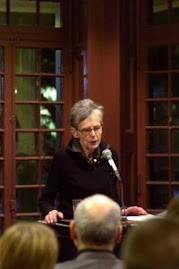
 that anyone has yet got the imaginative measure of that terrifying day six years ago. Certainly our Tolstoy has not crawled out of the rubble. The closest we have, Don DeLillo, succeeded as an essayist-journalist ("In the Ruins of the Future: Reflections on Terror and Loss in the Shadow of September,” Harper’s, December 2001) but, to my mind, failed as a novelist ("Falling Man"). One reason, perhaps, is that the remembered emotion was instantly buried under a pile of cultural junk.' - Tod Gitlin in his review of Susan Faludi's The Terror Dream (written for
that anyone has yet got the imaginative measure of that terrifying day six years ago. Certainly our Tolstoy has not crawled out of the rubble. The closest we have, Don DeLillo, succeeded as an essayist-journalist ("In the Ruins of the Future: Reflections on Terror and Loss in the Shadow of September,” Harper’s, December 2001) but, to my mind, failed as a novelist ("Falling Man"). One reason, perhaps, is that the remembered emotion was instantly buried under a pile of cultural junk.' - Tod Gitlin in his review of Susan Faludi's The Terror Dream (written for 